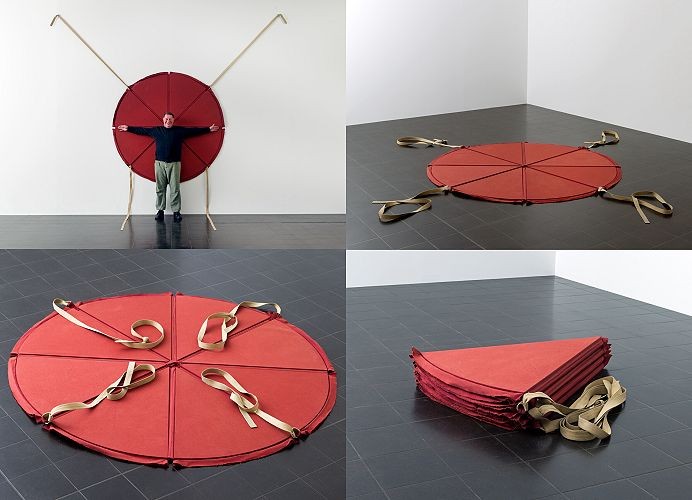Franz Erhard Walther
24 Mar - 23 Jun 2013

Franz Erhard Walther (*1939)
Rote Scheibe mit vier Bändern, 1963
Neuinstallation der 1963 konzipierten Werkzustände Baumwollstoff, Holz
190 x 1,7 cm (Scheibe), je 200 cm (Bänder) Hamburger Kunsthalle © VG Bild-Kunst, Bonn 2012 Photo: Piezug / Moschkowitz, Hamburg
Rote Scheibe mit vier Bändern, 1963
Neuinstallation der 1963 konzipierten Werkzustände Baumwollstoff, Holz
190 x 1,7 cm (Scheibe), je 200 cm (Bänder) Hamburger Kunsthalle © VG Bild-Kunst, Bonn 2012 Photo: Piezug / Moschkowitz, Hamburg
FRANZ ERHARD WALTHER
Curator: Luisa Pauline Fink
24 March – 23 June 2013
In the early 1960s, Franz Erhard Walther (b. 1939 in Fulda, Germany) developed a set of works that raised fundamental questions regarding the concept of sculpture. Made of fabric, wood, steel and foam material, his sculptural objects – which include ribbons, rectangles, angles and straps – are generally seen to fulfil the formal criteria of Minimalism, but Walther himself regards them as working materials. The sculptures are intended to be used by the artist and also by viewers in so-called 'work actions' (Werkhandlungen). According to Franz Erhard Walther, the work is manifested only through being activated in this way.
The Franz Erhard Walther exhibition at the Hamburger Kunsthalle presents an impressive selection of works from the museum's own collection that were created mostly in the 1960s and 70s. Not least due to the fact that the artist taught at the Hochschule für bildende Künste in Hamburg for over 30 years, many of the works have a direct connection to the city. Along with sculptural objects, the presentation includes watercolours and drawings that visualise the conceptual dimension of Walther's oeuvre. Photographs and films of previous Werkhandlungen – drawn mainly from the artist's personal archive – document the history of the respective works and show the context in which they were created.
Franz Erhard Walther will alter the display several times over the course of the exhibition and thus demonstrate the different Werkzustände he developed during the 1960s and 70s. The modifications will be carried out by the artist himself and will be open to public viewing. This processual form of presentation and systematic review of the contextual framework convey the complexity of Franz Erhard Walther's work.
A catalogue (German/English) will be published by Hatje Cantz to accompany the exhibition.
Curator: Luisa Pauline Fink
24 March – 23 June 2013
In the early 1960s, Franz Erhard Walther (b. 1939 in Fulda, Germany) developed a set of works that raised fundamental questions regarding the concept of sculpture. Made of fabric, wood, steel and foam material, his sculptural objects – which include ribbons, rectangles, angles and straps – are generally seen to fulfil the formal criteria of Minimalism, but Walther himself regards them as working materials. The sculptures are intended to be used by the artist and also by viewers in so-called 'work actions' (Werkhandlungen). According to Franz Erhard Walther, the work is manifested only through being activated in this way.
The Franz Erhard Walther exhibition at the Hamburger Kunsthalle presents an impressive selection of works from the museum's own collection that were created mostly in the 1960s and 70s. Not least due to the fact that the artist taught at the Hochschule für bildende Künste in Hamburg for over 30 years, many of the works have a direct connection to the city. Along with sculptural objects, the presentation includes watercolours and drawings that visualise the conceptual dimension of Walther's oeuvre. Photographs and films of previous Werkhandlungen – drawn mainly from the artist's personal archive – document the history of the respective works and show the context in which they were created.
Franz Erhard Walther will alter the display several times over the course of the exhibition and thus demonstrate the different Werkzustände he developed during the 1960s and 70s. The modifications will be carried out by the artist himself and will be open to public viewing. This processual form of presentation and systematic review of the contextual framework convey the complexity of Franz Erhard Walther's work.
A catalogue (German/English) will be published by Hatje Cantz to accompany the exhibition.
